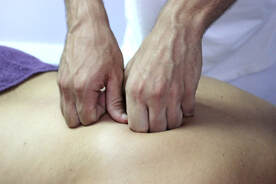What Is Osteopathy and How Can It Help You?What is osteopathy and how can it help your overall health and well-being? Here's everything you need to know about osteopathic medicine and how it works.
Keyword(s): what is osteopathy
Chronic physical and mental health conditions account for 90 percent of the $3.5 trillion spent on health care in the United States each year. The Centers for Disease Control and Prevention estimates that 20 percent of American adults live with chronic pain.
Do you have a health condition, suffer from pain or hope to avoid future medical problems? You may want to consider osteopathy.
What is osteopathy? It's a growing branch of medicine that is grabbing the attention of both patients and health practitioners.
Here's everything you need to know about osteopathy. We'll cover what it is, how it works, why patients prefer it and what to expect at your first appointment.
What Is Osteopathy?Osteopathy is its own branch of medicine in the United States. It's different from more traditional branches because it's holistic. Osteopaths understand the body's systems work together to make a unified, healthy whole. Their diagnostic and treatment approaches reflect this special value.
A Doctor of Osteopathic Medicine is known as a DO, which is a fully-licensed designation. Just like a traditional MD, or Medical Doctor, becoming a DO requires:
- Extensive graduate-level education
- Training (residency, fellowship)
- Tens of thousands of hours caring for patients
How Does Osteopathy Work?Osteopathy operates on the holistic principle that each part of the body is connected to form a whole. Everything must work well for you to feel healthy.
One of osteopathy's top tools is called Osteopathic Manual Medicine. This is a type of manual therapy. Doctors use hands-on techniques to diagnose and treat patients.
DOs prioritize manual medicine because they see the body's function and structure as working together. If the structure is out of line, body functions will also be off. Hands-on techniques focus on muscles, soft tissue, connective tissue, the head, the lymphatic system and more.
Because of this hands-on aspect, some people confuse DOs with chiropractors. Although chiropractors use their hands to adjust spines, they do not have nearly the same amount of training as DOs. Chiropractic care also focuses more on the spine rather than the entire body.
What Happens With Osteopathic Primary CareIf you have a DO or other osteopathic provider, you have a guardian of wellness on your side. Your doctor is helping you manage problems from a broad approach. He or she is also preventing issues from surfacing in your future.
Your provider understands how your lifestyle and environment impact your overall health. This is important because these are things that you can usually control.
When you use osteopathic primary care, you can expect your practitioner to listen to you. He or she will do what it takes to get to the root of your health problems or concerns.
How Osteopathy Approaches Special Situations: Pain and Opioid Addiction TreatmentOsteopathic practitioners work in many specialties and have holistic approaches for many problems. Here are just a couple of examples.
Osteopathy's effectiveness in treating all sorts of pain is well established. Studies support its use for carpal tunnel, migraines and low back pain, to name a few. If you have any kind of pain, including headaches, a sports injury or irritable bowel, you may want to consider osteopathy.
Some osteopaths also have special approaches to dealing with addiction. This is a critical medical contribution. The U.S. Department of Health and Human Services says the opioid epidemic is a public health emergency.
If you're addicted to opioids or opiates, consider the benefits of combining osteopathic manipulative medicine with buprenorphine (suboxone) assisted treatment. Buprenorphine is an FDA-approved treatment that prevents withdrawal, treats pain and stops opioid and opiate cravings. You won't get a high or feel sedated.
Why Choose Osteopathic Care?
Your body's parts and systems do not operate in isolation. Instead, every part of your body works as an integral aspect of your overall health. Osteopathy understands this and looks at the body as a whole. Neck pain is never just about the neck, and heart disease isn't a concern isolated to the heart.
Osteopathy's holistic view helps balance all systems to treat and prevent injury and disease. This approach emphasizes self-healing, not drugs or surgery. The treatments are not invasive and complement any traditional medical treatments you receive.
When you're looking for a DO, consider a clinic that offers complementary services, such as medical massage. Many patients find that massage helps their bodies prepare for Osteopathic Manipulative Medicine. Massage also can reduce muscle tension and regulate emotions, including anxiety. You'll be supporting your overall healing process.
What to Expect at Your First Appointment.
Osteopathy is centered around the patient's needs. This means your provider will want to meet you before deciding on any treatments. Wear comfortable clothes that make it easy to move around.
Your provider will ask you to demonstrate some stretches and other movements. He or she will gently touch your joints, ligaments and tissues to see how they move. This will reveal any restrictions, tightness or tension that your treatments should target.
After your assessment, your provider will sit down with you to discuss your current concerns and future goals. Based on this assessment, you will receive a comprehensive proposed treatment plan. This will include the number of anticipated sessions.
Your treatment may include changes to make at home. These can include making adjustments to your diet, exercise routine, posture and habits. You may also receive advice on what you should do before and after future appointments. Be sure to follow through — that's how you will come to see the best results.
Try Osteopathy to Holistically Treat and Prevent Problems
What is osteopathy? It may be the answer you're looking for. It can help you better manage an injury or health problem. It can also help prevent future issues and improve your general health.
To schedule an appointment in the Indianapolis area or learn more about what osteopathy can do for you, contact us today.


 RSS Feed
RSS Feed